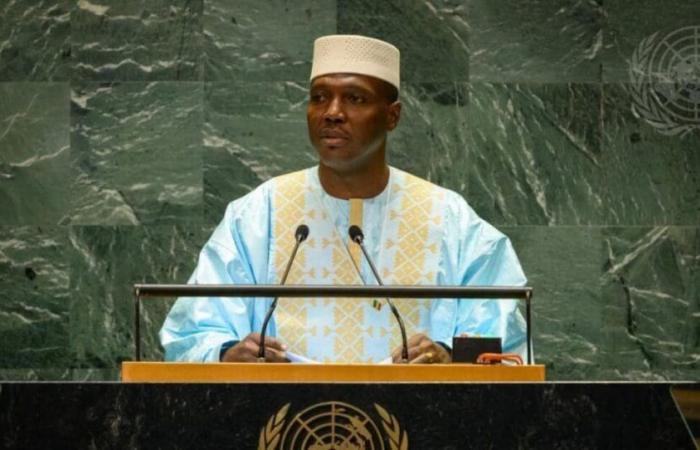
The Algerian-Malian crisis has moved to the UN. Indeed, the 79th session of the United Nations General Assembly has once again shown the increasingly yawning gap between Bamako and Algiers. Placed under the theme “Leaving no one behind: acting together for peace, sustainable development and the human dignity of present and future generations”, this session was also one of verbal jousting between diplomats from the two countries. Algerian diplomacy, which no longer shines, as evidenced by its execrable relations with its neighbors and its low blows towards its historical friends, including Russia, finds the opportunity to attack its neighbors without reason.
From now on, Mali has become a sworn enemy of the Algerian authorities since Bamako, as part of its sovereign policy, wished to free itself from Algerian supervision by putting an end to the Algiers Agreement of 2015. An agreement from which Algiers is served to overstep its role as facilitator and make Mali its private preserve.
Read also: Mali-Algeria: “It’s an unfriendly attitude”, Malians react to diplomatic tensions between the two countries
Since then, relations have become tense between the two countries with ambassadors on both sides being recalled, after Bamako denounced destabilization attempts by its northern neighbor. The deadly attack against Malian soldiers and their Russian supporters on the Algerian border has worsened the crisis between the two countries.
Algiers could not tolerate Malian drones eliminating its protégés from the Tuareg rebellion and GSIM terrorists near its border. Forgetting that these rebels and terrorists were eliminated on Malian territory, Algiers did not hesitate to openly threaten Mali. It is in this context that Algerian diplomats continued to shoot down the Bamako authorities, going so far as to threaten to involve its air force to confront Malian drones. Algiers brandished these threats and accusations all the way to the UN platform.
However, the Malian response was vigorous and Colonel Abdoulaye Maïga, Minister of State and spokesperson for the Malian government, did not wear gloves to deliver their four truths to the Algerian diplomats. In his speech, the Malian Deputy Prime Minister reacted strongly to recent statements by Algerian officials. He notably described the Algerian Minister of Foreign Affairs and the permanent representative of Algeria to the UN as “diplomatic fanatics”, accusing them of ignoring the common history between the two countries and the geography of the region. , stressing that these two officials seem to ignore “the exceptional contribution of Mali to the Algerian war of liberation”.
Therefore, the Malian official declared, on three occasions, that “Mali demands from these two diplomatic fanatics that they stop entering history backwards”.
Reacting to the intervention of the Algerian Minister of Foreign Affairs, Ahmed Attaf, on the need for a political solution in Mali, which would necessarily pass, according to him, through Algiers, Maïga’s response was clear and clear. He retorted to the Algerian Minister of Foreign Affairs that “no one can love Mali more than the Malians”. Clearly, Bamako no longer intends to go back and entrust its future to Algiers. Indeed, despite the numerous agreements sponsored and signed in Algeria between previous governments and the northern rebellions, peace has never returned to Mali. Worse, with the latest Algiers agreements, Bamako lost some of its sovereignty over northern Mali. What annoys Algiers is that the Malian authorities have managed to recover the entire north of the country, pushing the rebel leaders to take refuge in Algeria.
And it is with this in mind that the Malian official also castigated the comments of the Algerian permanent representative to the UN concerning the presumptions of drone strikes having caused civilian victims. Maïga calling them “serious and unfounded accusations”. In reality, what shocks Algiers is not the Malian civilian deaths, but the elimination of its protégés in Tinzaouatène, a twin town located on both sides of the Algerian-Malian border, and which Algiers has transformed into a bastion and neighborhood general for Iyad Ag Ghali, head of the Support Group for Islam and Muslims (GSIM), linked to Al Qaeda.
Read also: Algeria admits supporting “legitimate resistance” in Mali
To show Bamako’s annoyance towards Algeria, the Malian minister, in front of the representatives of all UN member states, hammered out three times the demand of the new Malian authorities by repeating that Algiers should not consider the Mali “like a wilaya”, an Algerian province. Clearly, Bamako reiterated its wish that Algeria stops considering Mali as a backyard.
These outings and replies illustrate the tensions between the two countries. Algiers cannot accept that Bamako decides to put an end to the Algiers Agreement which makes it lose its influence in the north of Mali, transformed into a zone of insecurity and all illegal trafficking.
Since then, the Algerian authorities have continued to use all subterfuges to destabilize their southern neighbor through their support for rebels and terrorists who find in Algeria a land of refuge from the Malian forces and their Russian support, even going so far as to request the effective support of the Ukrainians, to the great dismay of Moscow, the historic ally of Algiers!





